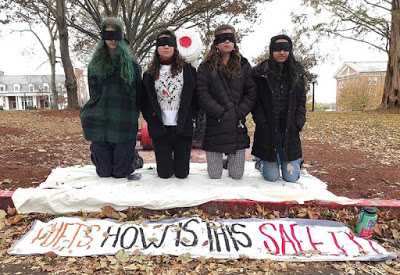Boston students vilified for tackling how Israel trains US cops
 |
| Nora Barrows-Friedman 1 May 2020 |
Officials at Tufts University in Boston have denounced Students for Justice in Palestine for helping expose collaboration between the US police and Israel’s forces of occupation.
The SJP group at Tufts was given an award on 22 April by the university’s Office for Campus Life.
The award recognized the years-long work that SJP has undertaken in the Deadly Exchange campaign.
A project of Jewish Voice for Peace, Deadly Exchange aims to end collusion and training between US policing agencies and Israeli forces.
Israel lobby groups, including StandWithUs, AMCHA and CAMERA on Campus, swiftly condemned SJP, labeling Palestine rights advocacy as incitement of “hatred and intolerance.”
The groups urged the president at Tufts to rescind the award.
The pressure seems to have prompted university officials to throw their students under the bus.
In the administration’s first statement about an issue other than COVID-19 since February, Anthony Monaco, the university’s president, and other senior figures at Tufts repeated Israel lobby talking points to smear the boycott, divestment and sanctions (BDS) movement for Palestinian rights as anti-Semitic.
The administrators claimed that the award “should not have” been given to SJP and that it “has caused a great deal of pain and concern for Jewish members of our community and others who share concerns about SJP’s policy positions.”
They added that they will begin supervising the awards process “to ensure proper oversight and review going forward.”
The Anti-Defamation League, a major Israel lobby organization which has boasted that since 2004 that it has sent hundreds of “law enforcement executives” to be trained by Israeli forces, thanked the Tufts president and asserted that SJP fosters anti-Semitism.
“The domineering of Tufts officials here reflects the growing rift between campus support for Palestinian freedom and removed college bureaucrats,” said Amira Mattar from the organization Palestine Legal.
“It is patently absurd that high-level administrators are micromanaging those on the ground who see the day-to-day efforts of these students,” Mattar added.
Along with student groups and human rights organizations, Palestine Legal is calling on Monaco to revoke the statement.
Saying it is “appalled and saddened” to be falsely accused of anti-Semitism for its work defending Palestinian rights, Tufts SJP – in a statement supported by more than 40 student organizations on campus – notes that it is particularly shameful “that the university has focused on condemning a justice-driven club when the university has not adequately supported our community during this pandemic.”
While students struggle to afford tuition, and don’t know yet whether campus housing will be available, “the administration has waged unsupported allegations against students who believe all people deserve a safe campus, from Tufts University to Palestine,” the group writes.
To see the Tufts administration adopt these anti-Semitism smears against Arab students who are already targets of racism, and erasing Jewish students involved in the Deadly Exchange campaign is, according to the SJP group, “extremely disheartening.”
Campus police chief trained in Israel
In 2017, Tufts’ campus police chief attended a “counter-terrorism seminar” in Israel.
The trip was funded by the ADL.
When news of that trip emerged, Tufts SJP helped build a coalition of more than 15 student groups working to end police militarization, the abuse of students of color on campus and these types of police training trips.
They demanded that the university issue a formal apology for the campus police chief’s participation in this exchange. The groups are planning to launch a campus referendum after the university is reopened following the coronavirus shutdown.
Tufts SJP has met with the administration several times, seeking to end the militarization of campus police.
Yet officials refuse “to publicly condemn it or commit to never sending police on military training trips again,” Molly Tunis, a Tufts SJP member, told The Electronic Intifada in March.
Israel lobby organizations have taken scores of officials from US police departments and federal agencies to Israel to learn “counterterrorism” techniques Israel has developed through decades of occupying Palestinians and systematically violating their rights.
Notably, the ADL has for years turned its attention to pressuring university administrations to crack down on Palestine solidarity organizing in US universities.
Students at Tufts say that this backlash against students who advocate for Palestinian rights is nothing new.
But since December, when US President Donald Trump signed an executive order allowing mere accusations of anti-Semitism against campus critics of Israel to result in lengthy inquisitions by the government, that backlash is being amplified.
However, so is student solidarity.
“Students from other groups on campus are starting to understand why the treatment of SJP has been so unfair,” Tufts SJP member Julia Asfour told The Electronic Intifada.


